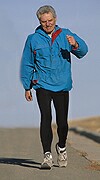
TUESDAY, April 17 (HealthDay News) — Patients struggling with moderate to severe heart failure might benefit from testosterone supplementation to boost their ability to exercise, new Canadian research suggests.
But it’s far too soon to recommend testosterone as a therapy for heart failure patients, a cardiology expert warned.
The research team analyzed four randomized studies, conducted between 1980 and 2010, which had examined the potential benefit of treating heart failure patients with testosterone supplementation.
“Heart failure is a chronic condition that can be brought on by blockages in the heart, lung disease, diabetes or kidney disease,” said study co-author Justin Ezekowitz, an assistant professor in the department of cardiology at the University of Alberta as well as at the Mazankowski Alberta Heart Institute, both in Edmonton. “It’s a clinical syndrome, where the body can not pump enough blood to meet the body’s demands for oxygen to do things like exercise properly.”
“And what we found in the few small trials that we looked at is that testosterone therapy helped patients to realize quite striking and quite important benefits in terms of their ability to exercise,” he added. “The improvements were very significant.”
The study, which received partial funding from the Canadian Institutes of Health Research and from Alberta Innovates-Health Solutions, appears online April 17 in the journal Circulation: Heart Failure.
The authors noted that heart failure patients with low testosterone levels often experience difficulty engaging in routine exercise regimens alongside the loss of both muscle mass and strength.
The studies they looked at focused on nearly 200 patients at an average age of 67, with three studies involving only men and a fourth involving only women.
In each study, some patients received commercially available testosterone supplements, while the others were given sugar pills for comparison. The testosterone was applied by patch, gel or injection, and female patients received much lower doses than males.
Study length varied from just three months to as much as a year, and during that time the patients were not put on any special exercise program. However, at the end of each respective trial, all the studies assessed exercise capacity improvements through various walking, endurance and oxygen intake and breathing tests.
The results: Testosterone therapy appeared to confer a “significant improvement” to heart failure patients in terms of their overall ability to exercise and their muscle and skeletal endurance.
What’s more, the therapy did not seem to negatively affect the heart health of any of the treated patients, the researchers said. Nor was there any indication of treatment-related prostate disease among the male supplement patients.
“These studies only looked at exercise function,” Ezekowitz noted. “This is important, because improved function translates into how active a person can be, which can affects a patient’s overall quality of life. But it does not say anything about how testosterone therapy might affect a patient’s risk for death or hospitalization. That is still uncertain, and we need larger clinical trials to assess that.”
Commenting on the findings, Dr. Gregg Fonarow, a professor of cardiology at the University of California, Los Angeles, stressed the preliminary nature of the studies.
“We know that heart failure is characterized by exercise intolerance, muscle wasting, hospitalization and mortality,” he said. “And therefore the use of anabolic steroids could potentially play a beneficial role.”
“But at the same time, they can also potentially raise the risk for coronary artery disease and heart failure,” Fonarow added. “So, it’s critical to point out that these are small studies, and that no current guidelines recommend the use of testosterone or any other hormonal therapy for heart failure at this time. So this is certainly an area where proceeding cautiously is warranted, while further carefully controlled, larger randomized trials are conducted.”
More information
For more on heart failure, visit the U.S. National Library of Medicine.

